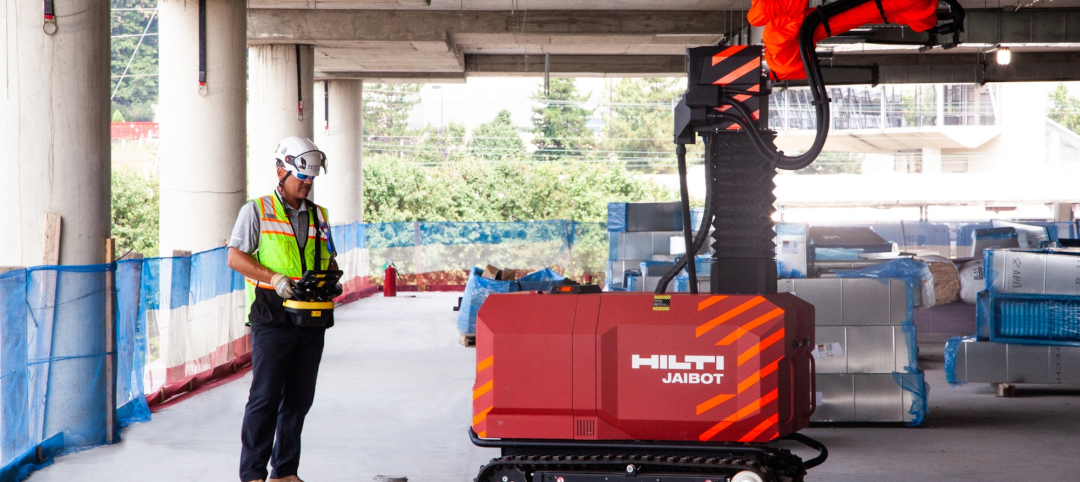Managers of companies in the industrial sector, including construction, have bought the hype of artificial intelligence (AI) as a transformative technology, but their organizations are not ready to realize its promise, according to research from IFS, a global cloud enterprise software company.
An IFS survey of 1,700 senior decision-makers found that 84% of executives anticipate massive organizational benefits from AI. The top three areas where AI is expected to deliver high impact value are product and service innovation, improved internal and external data availability, and cost reductions and margin gains.
But many organizations have not prioritized key elements of AI development, nor do they have the infrastructure and skills required to reap the rewards. More than one-third (34%) of businesses have not moved to the cloud. “While this is not essential to AI adoption, it is indicative of an unprepared enterprise unlikely to be able to scale AI across their business,” IFS says.
“The lack of maturity at the data foundation layer needs to be addressed as part of an overall AI strategy, otherwise AI simply will never be the magic bullet that can turbocharge the enterprise,” says Christian Pedersen, chief product officer, IFS. “Clearly enterprises need support on data management and migration. While AI is seen as a shiny new tool that will revolutionize business, like all technology, it is never that simple. The power of industrial AI is that it can touch all facets of a business, from product innovation and customer experience to productivity and ESG.”
Here is the full press release from IFS:
New research from IFS, the global cloud enterprise software company, has found that executive and board leadership have ‘bought the AI hype’ but organizations are unable to deliver operationally on expectations. The new global study of 1,700 senior decision makers, Industrial AI: the new frontier for productivity, innovation and competition, found that the promise of AI is being held back by technology, processes and skills. Half of respondents remain optimistic that with the right AI strategy, value can be realized in the next two years, and a quarter believe in the next year.
Expectations failing to meet reality
84% of executives anticipate massive organizational benefits from AI, with the top three areas AI is expected to deliver value in being high-impact: product & service innovation, improved internal & external data availability, and cost reductions & margin gains. The hype has become so high that 82% of senior decision-makers acknowledge that there is significant pressure to adopt AI quickly. However, this same group of respondents state that they are concerned that a failure to plan, implement and communicate properly means AI projects will stall in pilot stage.
Many organizations have not prioritized elements of development, nor have the infrastructure required to reap the rewards or the skills to deliver on that promise. The study found that over a third (34%) of businesses had not moved to the cloud. While this is not essential to AI adoption, it is indicative of an unprepared enterprise unlikely to be able to scale AI across their business. According to IFS, a robust Industrial AI strategy requires a potent combination of cloud, data, processes, and skills. 80% of respondents agree that the lack of a strategic approach means they have insufficient skills in-house to successfully adopt AI. This sentiment is seen elsewhere in the research with 43% of respondents rating the quality of AI resources in their business, in terms of human skills, as passable and not where it needs to be.
Christian Pedersen, Chief Product Officer, IFS, commented: “AI is poised to become the most transformational enterprise tool ever seen, but our research reveals that there are still fundamental misunderstandings about how to harness its power within an industrial setting. It is telling that AI is expected to significantly reduce costs and raise margins, but a lack of robust strategy means most businesses are under-skilled and under-prepared to achieve these ambitions. We built IFS.ai specifically with these challenges in mind. AI value simply will not be found in a single AI capability but instead by delivering AI across all products and business processes. This supports customers' decision cycles and provides the data and AI services required to realize value faster.”
Pedersen continued: “Achieving this at scale needs a clear-eyed strategic focus, including the high-impact use cases specific to their industry, having a cloud-based infrastructure in place which has industrial AI embedded, and investing early in developing the skills needed. Adopting this approach will turn the tide of disillusionment, and deliver the benefits that boards and the C suite are demanding.”
Outlook optimistic but planning needed
The unfortunate reality of the skills gap means that in terms of AI readiness, many businesses are falling behind. IFS found that nearly half of respondents (48%) were most likely to say that they are gathering proposals and were much less likely to have a clear strategy and perceivable results (27%). A fifth of respondents are in the research phase, with uncontrolled tests taking place and a further 5% are lacking a coordinated approach and do not have anything in motion yet. Despite initial challenges, there is still optimism with respondents most likely to feel AI could make a significant difference to their business in 1-2 years (47%), and a further quarter (24%) believe it could be within a year.
In particular, respondents are most optimistic about the impact of AI in smart production and/or service delivery on effectiveness & business and operational management (22%) in the future. One fifth see the biggest impact being on innovation with new products and services (20%), growth & business model decision-making (20%), empowering people and increasing talent retention (19%), and customer experience and customer service (19%).
Action needed on data readiness
To reap these benefits, enterprises need to leverage the most strategic asset they have – their data. The right data volume and quality is critical for the success of AI applications. Respondents recognize how important real-time data is to successful AI projects, with over 4 in 5 (86%) stating this. Yet despite this recognition, less than a quarter (23%) of respondents have completed their data foundation with it supporting both data-driven business decision making and real time response to changes, suggesting that more work needs to be done to get data AI ready. Moreover, under half (43%) of respondents have majority structured data, with some unstructured.
Pedersen commented: “The lack of maturity at the data foundation layer needs to be addressed as part of an overall AI strategy, otherwise AI simply will never be the magic bullet that can turbocharge the enterprise. Clearly enterprises need support on data management and migration. While AI is seen as a shiny new tool that will revolutionize business, like all technology, it is never that simple. The power of Industrial AI is that it can touch all facets of a business from product innovation and customer experience to productivity and ESG. Its potential is massive if executives and organizations can combine vision, strategy, technology and skills. Now is the time to step back, take stock, and build a true Industrial AI plan and turn the hype into reality.”
Methodology:
Censuswide surveyed 1,709 C-level/President/SVP/Directors who work in Manufacturing, Telecommunications, A&D, Services, Construction & Engineering or Energy & resources in organizations with $50m+ annual revenue (Aged 18+) across the UK, USA, Canada, Germany, France, UAE, Norway, Japan, Australia, Sweden, Denmark and Finland between 06.03.2024 - 27.03.2024.
Related Stories
AEC Tech | Jan 27, 2023
Key takeaways from Autodesk University 2022
Autodesk laid out its long-term vision to drive digital collaboration through cloud-based solutions and emphasized the importance of connecting people, processes and data.
AEC Tech Innovation | Jan 24, 2023
ConTech investment weathered last year’s shaky economy
Investment in construction technology (ConTech) hit $5.38 billion last year (less than a 1% falloff compared to 2021) from 228 deals, according to CEMEX Ventures’ estimates. The firm announced its top 50 construction technology startups of 2023.
AEC Tech | Jan 19, 2023
Data-informed design, with Josh Fritz of LEO A DALY
Joshua Fritz, Leo A Daly's first Data Scientist, discusses how information analysis can improve building project outcomes.
AEC Tech Innovation | Jan 14, 2023
CES recognizes a Dutch firm’s wearable technology for construction management
The firm’s TokenMe product offers construction managers a real-time crowd- and asset-tracking solution via low-power, location-aware radio and RFID tags and multiple sensors through which data are processed with cloud-based artificial intelligence.
Digital Twin | Nov 21, 2022
An inside look at the airport industry's plan to develop a digital twin guidebook
Zoë Fisher, AIA explores how design strategies are changing the way we deliver and design projects in the post-pandemic world.
Giants 400 | Nov 14, 2022
4 emerging trends from BD+C's 2022 Giants 400 Report
Regenerative design, cognitive health, and jobsite robotics highlight the top trends from the 519 design and construction firms that participated in BD+C's 2022 Giants 400 Report.
Contractors | Nov 14, 2022
U.S. construction firms lean on technology to manage growth and weather the pandemic
In 2021, Gilbane Building Company and Nextera Robotics partnered in a joint venture to develop an artificial intelligence platform utilizing a fleet of autonomous mobile robots. The platform, dubbed Didge, is designed to automate construction management, maximize reliability and safety, and minimize operational costs. This was just one of myriad examples over the past 18 months of contractor giants turning to construction technology (ConTech) to gather jobsite data, manage workers and equipment, and smooth the construction process.
BAS and Security | Oct 19, 2022
The biggest cybersecurity threats in commercial real estate, and how to mitigate them
Coleman Wolf, Senior Security Systems Consultant with global engineering firm ESD, outlines the top-three cybersecurity threats to commercial and institutional building owners and property managers, and offers advice on how to deter and defend against hackers.
Webinar | Oct 6, 2022
Register today! Live webinar: The future of 3D + 360° construction progress management
Learn about the value of digital site documentation and progress monitoring, how reality capture is used for site documentation, and the value of both 3D scans and 360 photos. This live webinar will take place Thursday, October 20 at 2 ET/ 1 CT.
AEC Tech | Sep 23, 2022
Register today! Live webinar: 10 KPIs your AE firm needs to track for maximum project profitability
Join us for an engaging, live webinar presented by Steven Burns, FAIA, Chief Creative Officer at BQE Software as he explores 10 project performance KPIs that, when tracked properly, will transform the way your business operates, and subsequently how profitable each project is.

















